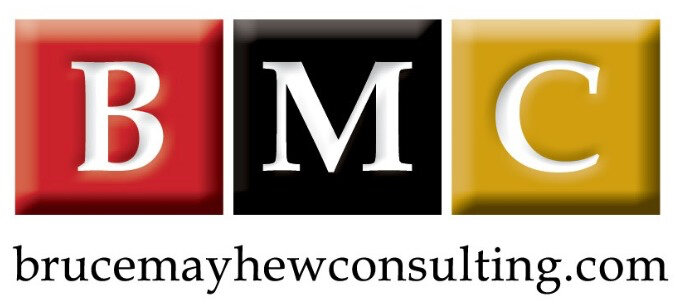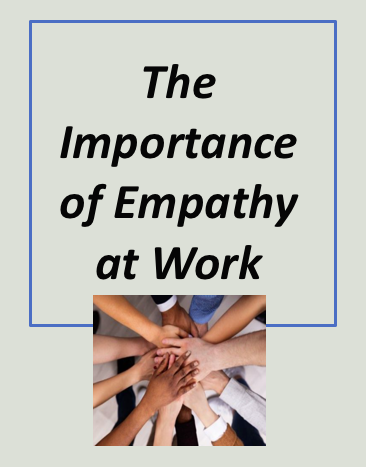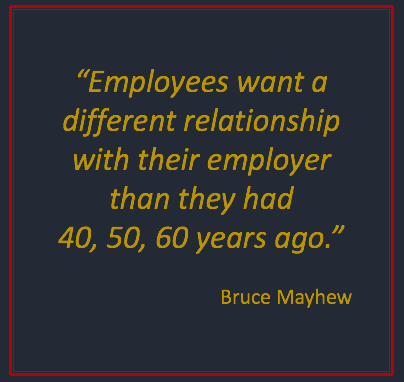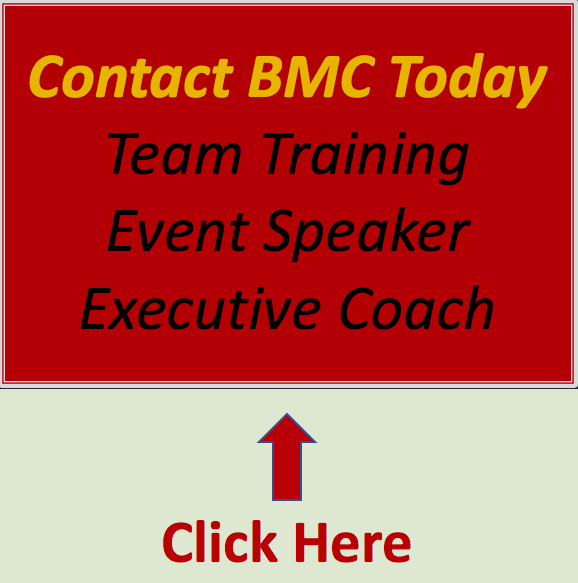The Importance of Empathy at Work
/Empathy, trust, being supportive and having perspective are four attributes great leaders have. As Simon Sinek said in his keynote at the Live2Lead event in 2016, “Great leadership is not about being in charge, it’s about taking care of the people in their charge. Great leaders go through a transition from being responsible for the job and become responsible for the people who are responsible for the job.” Sinek continues, “One problem is we are suffering from business theories left over from the 80’s, one being the concept of shareholder supremacy.” Shareholder supremacy is when leaders are focused on meeting the quarterly and annual revenue targets and not on building a caring, trusting, supportive environment where employees are proud, can do their best work and are loyal. As Sinek says, “Shareholder supremacy is a theory that is bad for people and bad for business.” When leaders only focus on shareholder value and their primary goal, they lose focus on “taking care of the people in their charge” says Sinek.
Today great leaders build a company that has the support of their employees and their customers as their primary goal by building an environment based on empathy, trust and shared perspective. Great leaders and great companies help each member of their team embrace purpose while also aligning business goals with individual goals. When employees business goals are supported, great things happen; creativity is high, productivity is high, solutions are responsive and appropriate, clients and suppliers are happy, brand reputation goes up, costs and expenses go down, turnover goes down.
What Exactly Is Empathy?
Empathy is being present with our self and with other people. A common description is that it is about being able to put yourself in the other persons shoes; to imagine what emotion they are experiencing and what it is like for them. Empathy is an acknowledgement (not agreement) of the other person and what they may be feeling / needing / believing. In times of creativity or disagreement empathetic people listen to what other people are saying, feeling and needing without judgement and without trying to influence what the other people are feeling, believing or needing.
Empathy is an interpersonal skill, a soft skill that is part of a person’s Emotional Intelligence (EI) or Emotional Quotient (EQ) (same thing, different name). In a professional setting, great leaders know that what will work for person A will be different than what will work for person B. Great leaders use skills like active listening and empathy to learn about each person in their charge so they can build trust and find that important balance between individual needs and company needs. In other words, a balance between empathy, trust and perspective.
Many people incorrectly think empathy is about being nice and doing unto others as you would have them do unto you. It is far more than that. As George Bernard Shaw said, “Do not do unto others as you would have them do unto you—they might have different tastes.” Empathy is about discovering those tastes. It is about being patient, respectful, thoughtful and trustworthy.
There are three types of empathy 1) Cognitive Empathy (a desire to understand), 2) Emotional Empathy (a desire to feel), 3) Compassionate Empathy, (a desire to help). For now, let’s focus only on Emotional Empathy and Cognitive Empathy:
Emotional Empathy – unconscious empathy. Empathy that evokes behaviours we have learned (often as children), and that are natural / instinctive for us. They demonstrate as second nature to us and likely considered one of our personal values.
Cognitive Empathy – empathy we deliberately turn on and turn off when we feel the need.
To be high on the EI / IQ scale, we use both. To really be ‘ON’ and with someone we have to choose to add Cognitive empathy to our situation to further support emotional empathy.
Empathy should not be confused with Mindfulness, but they are related, like cousins. Mindfulness is about “Paying attention, on purpose, without judgement”, Jon Kabat-Zinn. In contrast, Dr. Leslie S Greenberg shares a formal definition of empathy (which he calls empathic attunement) in his latest book called Changing Emotion with Emotion. Greenburg writes, “Empathic attunement to affect involves a kinesthetic and emotional sensing of another’s inner world, knowing their rhythm, feeling and experiencing by metaphorically being in their skin.”
Why is Empathy at Work Important?
People are attracted to people and to places that respect them and make them feel respected and safe.
When we are treated poorly and we don’t feel others trust us, it is unlikely we will trust the other person or people; we will protect our vulnerability. Both in a personal and professional setting, if you don’t trust someone else, it is unlikely you would be able to say, “I screwed up, I made a mistake, I don’t agree, or I am worried.” Another way common way many of us protect our vulnerability is to hold back on our creativity and new ideas. Instead, everyone plays it safe – hides and protects themselves.
When we demonstrate empathy, the other person / persons recognize we are showing them attention which is a validating feeling that they matter. When we feel we matter and also feel safe and respected and trusted, we can continue to have a supportive, productive relationship and work together even when we disagree; this is where we will be willingly open to find a compromise.
On an individual level, being an empathetic person (demonstrating empathy) can also make you and me happier. In an experiment, Daniel Goleman, a leader in EI walked through New York for 50 blocks. As he passed people… stressed out New Yorkers… he offered a positive greeting, sending out love and kindness. As it says in his Washington post article the result of this experiment is that he felt joy, a calming, pleasing, intrinsic reward he gave himself.
Conclusion
Empathy plays a significant role in getting the best from the people in our charge. A helpful mindset is to think, ‘how do I help my people be their best’ vs ‘how do I get the most out of my people’. The difference is subtle, but it is important.
I have one suggestion as you may explore your own relationship with empathy. Have people you let your guard down with and who you can be yourself; be able to give and receive empathy. It is always important for us to be able to freely connect with our emotions and to practice connecting with others around us. The alternative is that we can fall out of practice, especially if we live and/or work in a space that has little to no empathy. And in those cases where empathy is limited, do your very best to not close yourself off or begin reflecting the same unhealthy communication and emotional intelligence as those around you.
Thank you for reading about the importance of empathy at work… and everywhere else.
You may also be interested in reading my post, ‘How to Practice Empathy at Work’.
Bruce
About Bruce and Bruce Mayhew Consulting.
Bruce is Corporate Trainer, Keynote Speaker and Executive Coach.
Bruce Mayhew Consulting specializes in customized Difficult Conversations, Crucial Conversations or Conflict Management Training, Email Etiquette Training, Leadership & New Leadership Development, Generational Differences, Time Management Training and other soft skills training solutions in Toronto and across Canada. Bruce is also an Executive Coach to a few select clients.
Bruce is an experienced motivational speaker in Toronto and has inspired audiences across Canada and within the USA and the UK. Bruce works hard to always make sure your training event, conference, retreat, or annual general meeting is a success.




